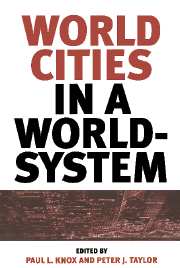Book contents
- Frontmatter
- Contents
- List of contributors
- Preface
- Part 1 Introduction: world city, hypothesis and context
- Part 2 Cities in systems
- 5 Cities in global matrices: toward mapping the world-system's city system
- 6 World cities, multinational corporations, and urban hierarchy: the case of the United States
- 7 Transport and the world city paradigm
- 8 The world city hypothesis: reflections from the periphery
- 9 Global logics in the Caribbean city system: the case of Miami
- 10 Comparing Chicago, New York, and Los Angeles: testing some world cities hypotheses
- 11 ‘Going global’ in the semi-periphery: world cities as political projects. The case of Toronto
- Part 3 Politics and policy in world cities: theory and practice
- Appendix The world city hypothesis
- Index
8 - The world city hypothesis: reflections from the periphery
Published online by Cambridge University Press: 07 October 2009
- Frontmatter
- Contents
- List of contributors
- Preface
- Part 1 Introduction: world city, hypothesis and context
- Part 2 Cities in systems
- 5 Cities in global matrices: toward mapping the world-system's city system
- 6 World cities, multinational corporations, and urban hierarchy: the case of the United States
- 7 Transport and the world city paradigm
- 8 The world city hypothesis: reflections from the periphery
- 9 Global logics in the Caribbean city system: the case of Miami
- 10 Comparing Chicago, New York, and Los Angeles: testing some world cities hypotheses
- 11 ‘Going global’ in the semi-periphery: world cities as political projects. The case of Toronto
- Part 3 Politics and policy in world cities: theory and practice
- Appendix The world city hypothesis
- Index
Summary
Introduction
In the decade since John Friedmann and Goetz Wolff (1982) launched the world city hypothesis with their ‘agenda for research and action’ on what one might call the political economy of the global urban system, much attention has been focused on the still smallish group of global control centres of the world economy. The hypothesis itself stimulated a fair level of academic work and debate, although somewhat less than might have been hoped in view of the increasingly intense integration of the world capitalist system. Moreover, this system is structured by inequality between immense power and profound weakness, in which vast wealth coexists with, and depends on, deepening immiseration and marginalization within world cities as much as any other class of city or territorial unit. In the words of Friedmann and Wolff (1982: 322):
They become the major points for the accumulation of capital and ‘all that money can buy’. They are luxurious, splendid cities whose very splendour obscures the poverty on which their wealth is based. The juxtaposition is not merely spatial; it is a functional relation: rich and poor define each other.
The phenomenon of ‘globalization’, itself necessarily now the subject of intense debate, more nuanced conceptualization, and more refined application (e.g. King 1991; Robertson 1992), has heightened awareness of the increasing concentration of formative political, economic, social, and cultural processes and practices on a world scale.
- Type
- Chapter
- Information
- World Cities in a World-System , pp. 132 - 155Publisher: Cambridge University PressPrint publication year: 1995
- 35
- Cited by

